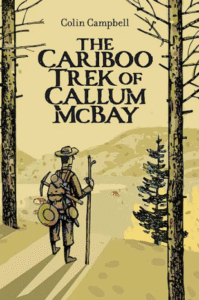Gold rush treachery
A young Scotsman seeks his fortune in the wild Cariboo gold fields of the 1860s.
October 13th, 2025

Colin Campbell was a high school teacher-librarian in Hundred Mile House and a columnist for The Hundred Mile House Free Press.
“I had seen the decent and unselfish side of men, along with the greedy and cruel… When it came down to it, the real gold was… the friendships made along the way.”
Review by Andrea Arnold
After a devastating blow to his family’s sheep farm in Scotland in 1862 and a looming bank loan repayment deadline, 17-year-old Callum McBay decides to try his luck in the Cariboo goldfields in the Colony of British Columbia (when BC was not yet a province), inspired by tales of fortune shared by his girlfriend’s father. These were the days of “go west young man” for those looking for treasure as author Colin Campbell describes in his historical fiction title for young adults, The Cariboo Trek of Callum McBay (Tradewind $14.95). The tale chronicles what a journey to the gold rush might have looked like for a young Scotsman driven by desperation and hope.
 Callum’s father agrees, and soon after, Callum embarks on a transcontinental journey in pursuit of financial stability for his family.
Callum’s father agrees, and soon after, Callum embarks on a transcontinental journey in pursuit of financial stability for his family.
The story focuses heavily on the physical and emotional challenges rather than the search for gold itself. McBay’s first leg, a horse-driven stagecoach ride to Liverpool, is unpleasant due to rough roads and the perfume of his seatmate. “By the time we reached the Liverpool docks, my bum was bruised, my legs felt like I’d walked the whole way and my clothes reeked of lilac,” says McBay.
From Liverpool, McBay boards a steamer to New York, then a sailing ship to San Francisco, followed by another steamer to Victoria, British Columbia. Campbell vividly brings to life the harsh conditions at sea—crowded quarters, foul smells and seasickness among the passengers. A series of storms nearly capsizes the ship and McBay is struck by the terror of the moment: “We’re not going to make it, I thought. None of us will.”
McBay’s cabinmate is taken to the infirmary when he struggles to keep anything down after several days at sea in the storm. The ship’s doctor says it might be consumption and that he may not be long for this world. Throughout the damaging storm, repairs to the ship are made and the injured are cared for; the dead are given a somber burial service.
After the storms, a period of dead calm causes yet more havoc and delays the ship further. Ice melts, provisions spoil and rations are enforced until the next port. It’s a grueling trip.
Upon finally reaching Victoria, McBay gathers supplies and boards an overloaded steamer on the Fraser River to Yale, a jumping off point for gold seekers. “A sardine would have been challenged to find space, and it seemed that few of the passengers had recently made contact with soap and water…or a laundry,” says McBay. Onboard, he meets Frank and Danny, who plan to take the Harrison River route, which they deem to be safer than the treacherous Fraser River. The trio continues north by boat and on foot, mixing camping outdoors with paid lodgings when they could afford it. The trio often rely on the kindness of strangers.
In Lillooet, they rent mules to ease their journey, but Danny is thrown from his mule and injures his ankle. With medical attention required, the group splits up and McBay continues alone on foot. After struggling with the weight of his supplies, he finds a surprising alternative to a mule—a camel named Nellie. Warned to avoid mules, since camels and mules clash, he sets off with Nellie and the two form an unlikely bond.
Eventually, McBay tries his hand at panning for gold along the Horsefly River but his success is cut short when his shack is robbed and Nellie disappears. Determined, he moves on to new creeks and abandoned claims, including Richfield near the famed Barker claim. He describes the boomtown that had sprung up: “A town, consisting of several close-packed log buildings raised on supports—with a wooden sidewalk running the length above its one very muddy street—had grown up around [the Barker claim].”
McBay works several sites, taking tips and borrowing tools from the experienced miners he meets. His modest success is not enough for more than survival, so he presses onward. One day, he stumbles upon a group of miners and is surprised to be reunited with a familiar face from earlier in his journey.
Without spoiling the ending (does McBay strike it rich or not?), Campbell concludes the story with McBay spending a few months working with this group as winter approaches. Eventually, he decides to return home to Scotland in time for Christmas, this time taking a train in hopes of a smoother trip than his outward voyage.
The experiences McBay brings home leave him with a new outlook on riches. He reflects: “I had seen the decent and unselfish side of men, along with the greedy and cruel. I had experienced the incredible beauty of this far-flung colonial outpost and observed the complete disregard so many miners had for the land that made them wealthy. When it came down to it, the real gold was not those flakes and nuggets teased from cold northern creeks, but the friendships made along the way.” 9781990598333
Andrea Arnold, a writer for the Rocky Mountain Goat newspaper, lives in McBride, BC.


Leave a Reply